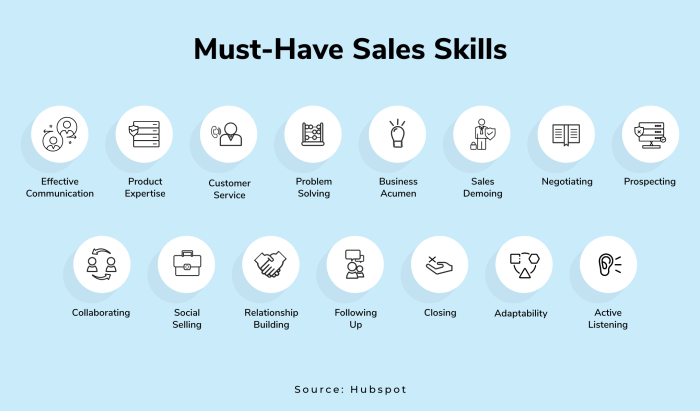Developing Sales Skills is like leveling up in a video game – it’s essential for success in any industry. Get ready to dive into the world of sales mastery with a fresh perspective and some killer tips.
Whether you’re a seasoned sales pro or just starting out, this guide will take your skills to the next level. Strap in and get ready to crush those sales targets!
Importance of Developing Sales Skills
Developing sales skills is crucial for professionals across various industries as it enhances their ability to effectively communicate, persuade, and close deals with potential clients. These skills are not only valuable for salespeople but also for individuals in leadership, marketing, and customer service roles.
Enhancing Career Growth
Honing sales skills can positively impact career growth by opening up opportunities for advancement and increased responsibilities. Professionals who excel in sales are often seen as valuable assets to their organizations and are more likely to be considered for promotions and leadership roles.
Achieving Business Targets
- Improving sales skills can help individuals in achieving business targets by increasing their ability to generate leads, convert prospects into customers, and ultimately drive revenue for the company.
- Strong sales skills also enable professionals to build strong relationships with clients, leading to repeat business and referrals, which are essential for long-term success in any industry.
- By understanding customer needs and effectively communicating the value of products or services, individuals with strong sales skills can contribute significantly to the overall growth and success of the business.
Types of Sales Skills to Develop
Developing key sales skills is crucial for professionals in the sales industry to excel and achieve success. Among the various skills, communication skills and active listening stand out as essential components in the sales process.
Communication Skills
Effective communication is the foundation of successful sales interactions. It involves not only conveying information clearly but also understanding the needs and preferences of potential customers. Sales professionals must be adept at verbal and written communication to build rapport, address concerns, and ultimately close deals.
- Utilize clear and concise language to convey product benefits and value propositions.
- Adapt communication style to match the preferences of different customers.
- Ask relevant questions to gather information and demonstrate understanding.
Remember, effective communication is a two-way street that involves both speaking and listening.
Active Listening
Active listening is a critical skill that allows sales professionals to truly understand the needs and motivations of their customers. By actively listening, salespeople can uncover valuable insights, address concerns effectively, and tailor their sales pitch to meet the specific requirements of each customer.
- Focus on the speaker without distractions and show genuine interest in their perspective.
- Ask clarifying questions to ensure complete understanding of the customer’s needs.
- Summarize key points to demonstrate active engagement and confirm mutual understanding.
Active listening goes beyond hearing words; it involves empathy, understanding, and meaningful engagement with customers.
Strategies for Improving Sales Skills

To excel in sales, it is crucial to continuously enhance various skills that contribute to successful interactions with clients and customers. Implementing effective strategies can significantly boost your sales performance and help you achieve your targets efficiently.
Enhancing Negotiation Skills
Negotiation plays a vital role in closing deals and reaching mutually beneficial agreements. To enhance your negotiation skills:
- Listen actively to understand the other party’s needs and concerns.
- Prepare thoroughly by researching the market and knowing your product inside out.
- Focus on building relationships rather than just securing a sale.
- Be flexible and willing to compromise to find win-win solutions.
Building Rapport with Clients and Customers
Building strong relationships with clients and customers is key to establishing trust and loyalty. To build rapport effectively:
- Personalize interactions by showing genuine interest in their needs and preferences.
- Communicate clearly and effectively to ensure mutual understanding.
- Follow up consistently to show reliability and commitment.
- Show empathy and understanding to create a positive emotional connection.
Importance of Product Knowledge, Developing Sales Skills
Having in-depth product knowledge is essential for sales professionals to showcase the value and benefits of the offerings. To improve sales effectiveness through product knowledge:
- Understand the features, advantages, and unique selling points of the products or services.
- Stay updated on industry trends, competitor offerings, and market insights.
- Be able to address customer queries confidently and provide relevant information.
- Educate customers on how the product can solve their problems or meet their needs.
Continuous Learning and Development

Continuous learning plays a crucial role in refining sales skills as the sales landscape is constantly evolving. By staying updated with the latest trends, techniques, and strategies, sales professionals can adapt to changes and improve their performance.
Benefits of Attending Sales Training Workshops and Seminars
- Opportunity to learn from industry experts and top performers in the field.
- Exposure to new methods, technologies, and tools that can enhance sales effectiveness.
- Networking with other professionals in the industry, leading to potential collaborations and partnerships.
- Boosting motivation and morale by gaining new insights and perspectives.
Role of Seeking Mentorship in Developing Sales Skills
- Guidance from experienced mentors can provide valuable feedback and advice on improving sales techniques.
- Mentors can share their own success stories and lessons learned, inspiring mentees to strive for excellence.
- Building a strong professional relationship with a mentor can open doors to new opportunities and career growth.
- Learning from someone who has already navigated the challenges of the sales industry can accelerate skill development and performance.
